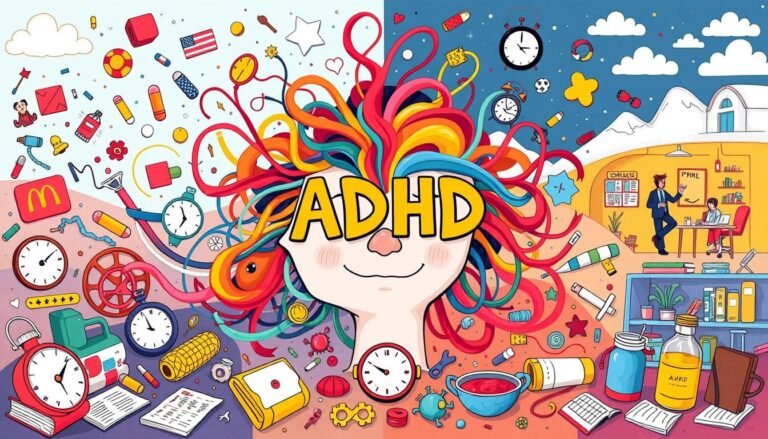Humanistic Theory: A Person-Centered Approach
Can therapy really help people become their best selves? This is at the core of Humanistic Theory, a new way of thinking in psychology from the mid-20th century. It believes people are naturally good and can grow, unlike old views of mental health.
Carl Rogers started Humanistic Theory in the 1940s. It sees people as experts of their own lives, focusing on growth and being the best version of oneself.
Humanistic Theory looks at how people see and understand their world. It’s different from other therapies, focusing on empathy, acceptance, and real understanding in therapy.
Let’s dive into Humanistic Theory more. We’ll look at its beginnings, main ideas, and how it changes therapy. Join us to see how it’s changing psychology and helping people reach their goals.
Origins of Humanistic Theory
Humanistic theory started in the mid-1950s as a new view in psychology. It opposed the leading schools of behaviorism and psychoanalysis. It brought a fresh way to understand human nature and actions.
Carl Rogers and the Development of Person-Centered Therapy
Carl Rogers was key in shaping humanistic psychology. In 1951, he published “Client-Centered Therapy.” This introduced a new method that put the client at the center of their healing.
This therapy focused on the person’s natural ability to grow and understand themselves. It was different from old ways because it believed in people’s inner strength.
Influence of the Human Potential Movement
The Human Potential Movement grew strong in the 1960s. It matched humanistic psychology’s ideas. It believed in people’s natural wish to reach their full potential.
In 1961, the Journal of Humanistic Psychology started. It gave a place for these new ideas to be shared.
Divergence from Behavioral and Psychoanalytic Theories
Humanistic theory was a big change from earlier views. It didn’t agree with behaviorism and psychoanalysis. It said people act based on what they see and feel now, not just hidden motives or outside factors.
By 1970, humanistic psychology was well-known. It became a part of the American Psychological Association. This made it a big player in the field, showing a more complete and hopeful view of human beings.
Core Principles of Humanistic Theory
Humanistic theory is a strong force in psychology. It focuses on personal growth and self-actualization. It sees humans as inherently good and capable of positive change.
At its core, humanistic theory emphasizes the present moment. It values each person’s unique experiences. The theory says that psychological issues come from when our self-concept clashes with reality.
- Importance of self-concept
- Role of current perceptions in behavior
- Belief in individual capacity for self-healing
- Focus on personal growth
Humanistic psychology believes behavior is not bound by past experiences. It believes in personal agency and the power of conscious experience. This approach values qualitative research and case studies over traditional scientific methods.
“The good life is a process, not a state of being. It is a direction, not a destination.” – Carl Rogers
Unconditional positive regard is a key part of humanistic therapy. It creates a supportive environment for clients to explore their feelings and experiences. This approach has shown significant efficacy, with large effect sizes in meta-analyses.
| Factors Influencing Therapy Outcome | Percentage |
|---|---|
| Client-related variables | 40% |
| Client-therapist relationship | 30% |
| Techniques | 15% |
| Placebo effect | 15% |
Humanistic theory continues to shape psychology and therapy. Its focus on personal growth and self-actualization remains relevant in our complex world.
The Concept of Self in Humanistic Theory
Humanistic theory focuses a lot on the self. It sees people as naturally good and able to grow. This view, by Carl Rogers and Abraham Maslow, looks at self-concept, congruence, and becoming a fully functioning person.
Self-Concept and Self-Esteem
Self-concept is at the heart of humanistic theory. It’s what we believe about ourselves. Rogers said self-concept has three parts: ideal self, self-image, and self-esteem. Our self-esteem grows when we feel valued without any conditions, known as unconditional positive regard.
Congruence and Incongruence
Congruence happens when our self-concept matches reality. Incongruence, a mismatch, causes psychological distress. Rogers thought helping people find congruence was crucial for mental health.
The Fully Functioning Person
The aim of humanistic theory is to help people become fully functioning. These individuals are open to new experiences, live in the moment, trust their feelings, make their own choices, and are creative. They’ve reached the highest level of Maslow’s hierarchy of needs: self-actualization.
| Characteristic | Description |
|---|---|
| Open to Experience | Embraces new ideas and situations |
| Lives Existentially | Focuses on the present moment |
| Trusts Feelings | Relies on intuition and gut instincts |
| Expresses Freedom | Makes choices independently |
| Creative | Thinks outside the box, innovates |
Person-Centered Therapy: A Cornerstone of Humanistic Theory
Person-centered therapy, created by Carl Rogers, is a key part of humanistic theory. It changed psychology in the 1940s, moving away from old ways of thinking.
The Therapeutic Relationship
The core of person-centered therapy is the bond between therapist and client. This relationship is seen as key for change. Rogers said therapists should be welcoming, real, and understanding to help clients feel safe.
Non-Directive Approach
This therapy doesn’t tell clients what to do. Instead, it creates a space for them to explore themselves. This lets clients lead their own healing journey.
Client as the Expert
In this therapy, clients know best about themselves. This idea helps them take charge of their growth. The therapist helps them find their own answers, not gives them solutions.
| Key Elements | Description |
|---|---|
| Therapeutic Relationship | Critical for promoting change |
| Non-Directive Approach | Supports client’s self-exploration |
| Client Expertise | Empowers individuals in their growth process |
Studies show empathy is key for progress in therapy. This highlights the importance of the relationship and approach in person-centered therapy. It shows valuing the client’s knowledge and growth.
Core Conditions of Person-Centered Therapy
Carl Rogers introduced person-centered therapy in the 1950s, changing psychology forever. It focuses on the client’s ability to understand themselves and grow. The therapy’s success relies on three key conditions that help clients change.
Unconditional Positive Regard
At the heart of person-centered therapy is Unconditional Positive Regard. Therapists accept and value clients without any judgment. This creates a safe space for clients to share their thoughts and feelings openly.
Studies show that when therapists accept clients more, therapy works better.
Empathic Understanding
Empathic Understanding means therapists must really get what the client is feeling. They listen carefully to the client’s experiences in the moment. This helps clients feel understood and valued, leading to growth and self-discovery.
Therapist Congruence
Therapist Congruence, or being genuine, is key in person-centered therapy. Therapists must be true and open with clients. This builds trust and lets clients be their real selves.
This honest approach is the base for real change and growth in therapy.
Source Links
- Person-Centered Therapy (Rogerian Therapy) – StatPearls
- How Humanistic Is Positive Psychology? Lessons in Positive Psychology From Carl Rogers’ Person-Centered Approach—It’s the Social Environment That Must Change
- Carl Rogers Theory & Contribution to Psychology
- No title found
- How Humanistic Theories Are Used in Psychology
- A renaissance for humanistic psychology
- Humanistic Approach In Psychology (humanism): Definition & Examples
- Humanistic Psychology – The Michigan School of Psychology (MSP)
- Humanistic Approaches: Core Beliefs & Values | UKAHPP
- Humanistic Theory of Self: Definition & Maslow
- Humanistic Theory
- Humanistic theory of self
- Carl Rogers’ Theory
- Humanistic Theory: Abraham Maslow And Carl Rogers
- A Humanistic Approach: The Foundational Principles of Person-Centred Counselling
- Person-Centered Therapy (Rogerian Therapy)
- Carl Rogers’ Core Conditions Carl Rogers’ Core Conditions Counselling Tutor
- No title found








